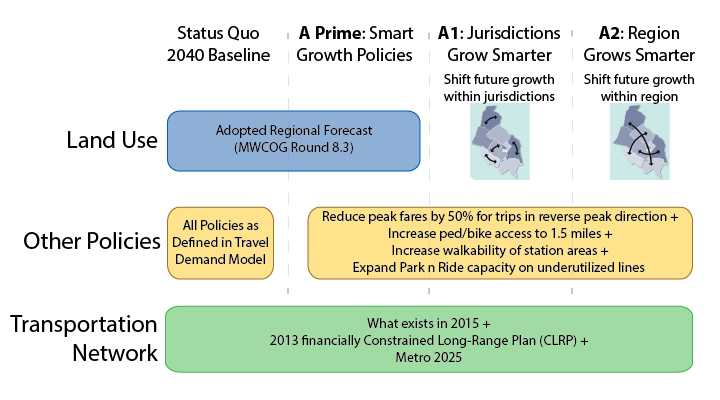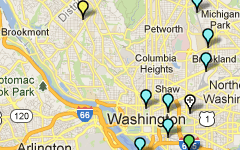Acting Regionally Pays Big Dividends (Part 3)
Adding jobs and households in transit-served areas not only increases Metro ridership, but also reduces and may even eliminate the subsidy that local governments pay to support Metro, meaning lower tax bills for regional residents.
(This post is part of a multi-part series* about ConnectGreaterWashington a study that WMATA completed in 2015 and its application of land use as a transportation strategy. The below post and links provide additional detail.)
In December of 2015, public and private leaders issued a call to action for the many jurisdictions in this region to start acting as one. We’ve actually been thinking about this for some time, and their announcement timed well with our desire to share perspectives on the following questions.
Questions:
- What if the region’s future actually approached the goals of collaborative regional plans such as Region Forward and Place + Opportunity?
- Would WMATA and the region benefit?
- Are there financial, social, quality of life and environmental benefits?
Answers: YES, YES, and YES!
Approach: Metro planners hypothesized that changing local jurisdictions’ and/or the region’s approach to future land use decisions, such as where to guide future jobs and population and expanding transit-supportive policies, could enable the region to better use the transportation system we already have rather than require us to spend tens of billions on new transportation projects.
Planners developed three different scenarios (A, B, and C) that used the transportation system we already have, but modified future growth policies that determine travel patterns. The below post talks only about Scenario A, which had a specific goal to increase ridership on all segments of the Metrorail system, while minimizing the potential for overcrowding on any segment in the system. The image below shows how we built Scenario A and its three iterations (A Prime, A1, A2).
Findings and Potential Benefits to the Region From Scenario A Results: The benefits are staggering. Key outcomes are listed below, but if you’d like to geek out, you can peruse a more detailed description of Scenario A, its iterations, inputs, results and key findings here (pdf).
- Scenario A Prime: Changing parking, fares, and walkability without addressing land use did very little to all measures analyzed. Land use changes are absolutely critical to affecting transportation outcomes.
- Scenario A1: Growing smarter within each jurisdiction did improve many of the transit-specific measures but also added to transit crowding and made traffic worse. It does not help balance the use of Metro or drastically improve its operating or fiscal positions.
- Scenario A2: Growing smarter as a region vastly improved the region across almost all measures. Most notably, the Metrorail subsidy became a surplus. Yes, Metro made money. Crowding on Metrorail and on other transit modes drastically increased and on some segments was not possible to serve without significant transit capacity expansion (e.g. new rail lines). Good news is that the annual surplus generated could pay for this expansion.
- The region doesn’t need major sticks (e.g. cordon charge) to get people to use transit. Locating jobs and housing in mixed use areas near transit and increasing walkability in those areas makes a huge difference in the propensity of residents to take transit.
*In case you’re just catching up, here’s a summary of ConnectGreaterWashington’s blog posts on alternative growth scenarios so far.
Part One of the series discussed why local land use decisions matter so much to Metro and summarized the potential benefits of approaching growth from a regional perspective.
Part Two outlined the study’s goals, assumptions, and approach to developing scenarios to assess benefits. Part Three below shows the outcomes from modeling scenarios that sought to increase system utilization and better balance the use of Metrorail across the system.
The technical report on the scenarios is available as is the final report on the entire project.



Recent Comments